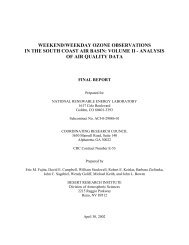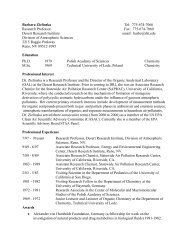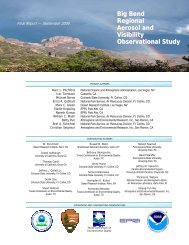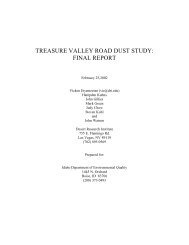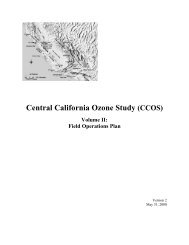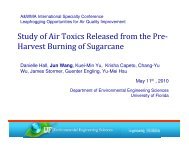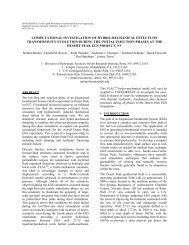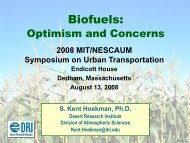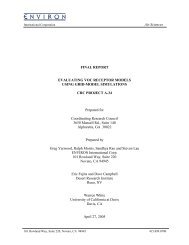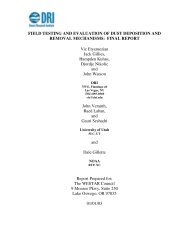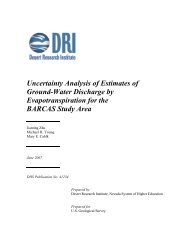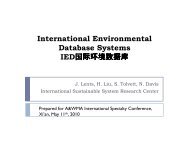Assessment of Conversion Technologies for Bioalcohol Fuel ...
Assessment of Conversion Technologies for Bioalcohol Fuel ...
Assessment of Conversion Technologies for Bioalcohol Fuel ...
Create successful ePaper yourself
Turn your PDF publications into a flip-book with our unique Google optimized e-Paper software.
Thermo <strong>Conversion</strong>s, Denver, Colorado<br />
Organizational Background–Thermo <strong>Conversion</strong>s (TC) is a privately help company<br />
involved in joint ventures with several organizations to pursue thermochemical<br />
bioenergy technology development. Partner companies include Wiley Engineering<br />
and others. TC plans are to develop and deploy fully integrated systems <strong>for</strong> the coproduction<br />
<strong>of</strong> bioalcohols, electricity and heat.<br />
Technology Characteristics–The TC technology utilizes thermochemical<br />
pyrolysis/steam re<strong>for</strong>ming in the absence <strong>of</strong> oxygen or air, intended to optimize<br />
conversion efficiency <strong>of</strong> biomass carbon to syngas. TC claims to have made a<br />
number <strong>of</strong> significant technical innovations and improvements to the state-<strong>of</strong>-the-art<br />
including: modular design that facilitates sectional construction and allows rapid<br />
service <strong>of</strong> parts and components; a track-feed biomass introduction system; a system<br />
that eliminates air from entering the pyrolysis chamber, minimizing oxidation <strong>of</strong> organic<br />
compounds; injection <strong>of</strong> ionized water into the reactor, enhancing syngas production<br />
and reducing production <strong>of</strong> tars and phenols; and a flue gas closed-loop recycling<br />
system to enhance carbon source conversion and reduce emissions.<br />
Energy efficient production <strong>of</strong> cleaned syngas is predicted by TC to represent energy<br />
content in the 400-600 BTU/cubic ft. range. This syngas can be used <strong>for</strong> the<br />
production <strong>of</strong> electricity, heat and steam or converted to liquid fuels and chemical<br />
feedstocks allowing the handling <strong>of</strong> most all types <strong>of</strong> feedstock materials.<br />
Development Status–The TC technology has been integrated with a syngas to<br />
bioalcohol and electricity production technology developed by Pacific Renewable<br />
<strong>Fuel</strong>s (PRF). The PRF technology employs next-generation catalysts and process<br />
control technologies <strong>for</strong> which several patents are pending. Parts, components and<br />
materials are applied that have undergone long-term testing under real-world<br />
operating conditions and that are readily available from reliable suppliers. The trackfeed<br />
biomass introduction system utilized has been proven to be reliable through many<br />
years <strong>of</strong> use by the coal industry.<br />
Future Plans–A 200 ton/day TC production plant <strong>for</strong> the conversion <strong>of</strong> biomass to<br />
electricity and bioalcohol is being built at a location in the Port <strong>of</strong> Toledo, OH area.<br />
This TC plant will be equipped with instrumentation that will allow environmental,<br />
energy and mass balance measurements. The plant has been designed with a high<br />
level <strong>of</strong> modularity so that operational changes can be made quickly to solve any<br />
problems that may arise and to further enhance the “optimization” <strong>of</strong> syngas energy<br />
value, purity, and volume output from the system. TC indicates they are also<br />
designing other plants <strong>for</strong> deployment in the U.S. and Canada.<br />
68



